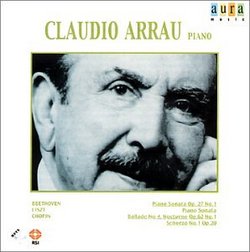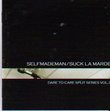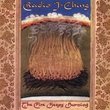| All Artists: Beethoven, Liszt, Chopin, Arrau Title: Beethoven: Piano Sonata No. 13 in E flat major Op. 27 No. 1 / Liszt: Piano Sonata in B minor / Chopin: Ballade No. 4; Nocturne Op. 62 No. 1; Scherzo No.1 Members Wishing: 0 Total Copies: 0 Label: Aura Music Release Date: 12/28/1999 Genre: Classical Styles: Chamber Music, Forms & Genres, Ballads, Sonatas, Historical Periods, Classical (c.1770-1830), Romantic (c.1820-1910) Number of Discs: 1 SwapaCD Credits: 1 UPCs: 801439018228, 8014394521821 |
Search - Beethoven, Liszt, Chopin :: Beethoven: Piano Sonata No. 13 in E flat major Op. 27 No. 1 / Liszt: Piano Sonata in B minor / Chopin: Ballade No. 4; Nocturne Op. 62 No. 1; Scherzo No.1
 | Beethoven, Liszt, Chopin Beethoven: Piano Sonata No. 13 in E flat major Op. 27 No. 1 / Liszt: Piano Sonata in B minor / Chopin: Ballade No. 4; Nocturne Op. 62 No. 1; Scherzo No.1 Genre: Classical
The Liszt Sonata's sweeping narrative, Faustian heroism, spiritual ecstasy, and unprecedented demands upon a pianist's technique and stamina make it seem as if it had been written specifically with Claudio Arrau in mind. T... more » |
Larger Image |
CD DetailsSynopsis
Amazon.com The Liszt Sonata's sweeping narrative, Faustian heroism, spiritual ecstasy, and unprecedented demands upon a pianist's technique and stamina make it seem as if it had been written specifically with Claudio Arrau in mind. The pianist's studio recording for Philips belongs in the collection of anyone who cares about Liszt. Fine as that recording is, however, Arrau's actual concert performances sometimes surpassed it. One such occasion was Arrau's 1971 recital in Ascona, Italy--a concert recorded for broadcast by Swiss-Italian Radio and available for less than $6 on Aura's fine-sounding transfer. There is an even wider range of color and nuance than in the pianist's studio version. The enormous security of the conception is not achieved at the expense of Spontaneity. The sonority of his octaves and fortissimos is glorious. The pianist's understanding of the music's structural development is subtle, and the tenderness and humanity of his response to it deep beyond measure. The disc is filled out nicely with performances of Beethoven's Sonata No. 13 and Chopin's Ballade in F Minor, Nocturne in B Major (Op. 62, No. 1), and Scherzo in B Minor. --Stephen Wigler Similar CDs
|
CD ReviewsBuy this CD John Reef | Bloomington, Indiana | 11/30/2001 (5 out of 5 stars) "This is the best recorded performance of Chopin's Fourth Ballade, and believe me, I know what I'm talking about. It is in every way superior to his 1950's studio recording. It is dripping with emotion, but without distracting eccentricities (as heard, for example, in Moisevich's recording on the Great Pianists of the 20th Century series). Everything else on this CD is wonderfully played, and the Liszt Sonata is played with an intense (dare I say aggressive?) energy not commonly characteristic of Arrau. You will not be dissapointed by this disk." Great, spontaneous recital from a pianist not renowned for s John Grabowski | USA | 02/16/2009 (4 out of 5 stars) "The stereotype among many who think they are sophisticated listeners, the type who dismiss artists' entire oeuvres with one word and a flick of fingernails against suitcoat, is that Claudio Arrau was stiff, pedantic and never spontaneous. While it's true he could get "anal" in the recording studio, especially towards the end of his life, his concerts were often thrilling experiences. This performance, recorded in 1971 in Ascona, Italy, is one of them. Here the Chilean virtuoso hurls himself into the Liszt B minor with vigor and a beautiful sense that he knows where he's going in this massive piece from the first bar. There are a few minor fingerslips but nothing one wouldn't expect from any live performance of this work. He gets the great middle lyrical sections gorgeously right, with some beautiful pedaling (though never much in the extreme dynamics--I don't think there's a ppp moment in the whole performance). But he also attacks the outer sections with the sort of old-world passion he's famous for. This is a thrilling performance, better than his Philips studio effort.
But it doesn't stop there. We also get a very elegant and deeply-probing reading of what is to me Beethoven's most underrated sonata, No. 13 in E-flat, Op. 27/1, which is overshadowed by its more famous sibling, No. 2, the "Moonlight." I find No. 1 to be the greater work, and Arrau's interpretation of it has always struck me as one of the best around. (His mid-60s Philips stuidio reading is also wonderful.) He gives it a mystery and "fantasia"-like quality that makes me wonder why the work isn't more renowned. His take on the Chopin F minor Ballade, while not "the best recorded performance" by a longshot, as reviewer John Reef seems to think, is quite fine, lacking a bit of the drama that should, me thinks, erupt in the coda, but otherwise very well-shaped and paced. The other Chopin works are gorgeous--he always had a way with the Nocturnes, though his performance here of the scherzo is a little labored in spots. The sound is good for a live (and probably bootleg) recording. Highly recommended if you've ever wondered what an Arrau recital sounded like as opposed to his studio work on Philips and EMI. " |

 Track Listings (10) - Disc #1
Track Listings (10) - Disc #1

